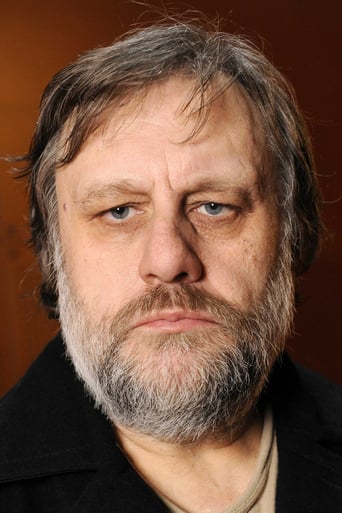Interesteg
What makes it different from others?
Aneesa Wardle
The story, direction, characters, and writing/dialogue is akin to taking a tranquilizer shot to the neck, but everything else was so well done.
Marva-nova
Amazing worth wacthing. So good. Biased but well made with many good points.
Staci Frederick
Blistering performances.
Alex Deleon
Viewed at Seattle IFF, 2007. The day's opener, an 11 AM screening at the Egyptian was "The Pervert's Guide to Cinema", one I was dying to see but had missed previously because of a scheduling conflict (with another flick I was even more dying to see)."Pervert's Guide" is a Dutch-Austrian production directed by British documentarian Sophie Fiennes'(39)i in which Slovenian Psycho-(ahem -"analytic") film philosopher and culture- theoretical guru, Slavoj Zizek disquisses in grammatically correct but perfectly outrageous English, on a hilarious range of sexual perversions and their possible interpretations in a broad variety of flicks from Hitchcock to David Lynch, via Kubrick and other collective libido obsessives — with cleverly selected excerpts from the "perverted" sequences of the films in question — goes on and on for two and a half excessive hours! (150 minutes). The first hour and a half was interesting, informative, revealing, psychologically insightful, and often highly amusing– in a scatological vein — but eventually I began to fidget when I realized this psychoanalytic orgy was going to last far longer than bargained for, and was beginning to cut into my Ali Baba time.By the third take on Dennis Hopper (one of the most disgusting psychos ever to disfigure a silver screen) in "Blue Velvet", I was beginning to get sick to my stomach — even more so when my illuminated Casio wristwatch revealed that I was missing the beginning of Ali Baba. Somehow I couldn't quite bring myself to stalk out before the end, but I did then scurry immediately over to the SIFF theater under the Opera House in time to catch the second half of Ali Baba — which turned out to be the perfect antidote to the mental illness that had gone before at the Egyptian. Mind-bending at times, sickening at others, but definitely worth The effort it tales to sit through.
dragokin
At a certain point i started wondering what Slavoj Žižek actually wants with this movie. It is clear that he is a philosopher and psychoanalyst, but without doubt he craves our attention. His narrative is rooted in Lacanian analysis and this is where my issues start.To quote Bryan Magee and his book The Story of Philosophy: "...when these complicated sentences were unraveled and analyzed, they often turned out to be rhetorically hollow, saying something only vaguely focused, or perhaps saying nothing at all, or else something trivial, or false, or self-contradictory."Therefore,i regard The Pervert's Guide to Cinema as a persiflage on the topic of cinema and its influence on our thoughts. Even philosophy is not spared of fashion. This is why Slavoj Žižek might claim to be a Stalinist and there would be people listening to what he might have to say. And he surely enjoys our discussion since it keeps him afloat until the next lecture.
treywillwest
For Zizek we are all perverts in that human consciousness is the attempt to postpone the confrontation with real experience- the horror of death and the misery of our toil, as well as the terror of achieved orgasmic bliss- through the construction of a less frightening fantasy life. Cinema is the ultimate means by which we project our fantasies of a more tolerable world. Zizek argues that the acute suffering of the oppressed of the current social order is tolerable only through the construction of a particular type of fantasy- that of the class struggle. It is an added dimension of fantasy for those who suffer the most in society. The difficulty with the progressive project is that it too is a form of postponement. The class struggle often finds itself drawn to the Utopian project- to the impossible-task as such. It imagines its own failure and this is its success as fantasy. Both the USSR, in the post-revolutionary period, and the USA, after the Cold War, imagined themselves the End of History. But this pronouncement of the End was actually a fantastic postponement of the real end- the fall of a given social order, or the death of the individual (or species). If we live in the End the present will never pass. The USSR had to face the end of its present. Zizek thinks capitalism is about to face a similar confrontation with the Terrifying Real.
nick-401
If you've ever been harassed on the Underground by a Christian who says, "Jesus is the answer. What's the question?", then perhaps you should thank God if you've never met a Lacanian. Slavoj Zizek, the most evangelical of Lacanians, would surely exchange the word "Jesus" in that statement for "Lacan/Hegel".Zizek's star burns brightly at the moment, no doubt because we generally view films and pop culture purely as entertainment for our consumption. So it seems impressive when someone - anyone - comes along and says, "Hang on, films may say something about ourselves."The ideas Zizek expounds in this film are "true" purely because he says so. For example, Zizek explains that three Marx Bros are the ego, superego and id (God knows what happened to Zeppo, or Gummo … perhaps they're the sinthome...or is that movies themselves?). This is simply what they are. In Zizek's output, culture is not there to be investigated but merely to be held as an example of his ideology. People may object that he certainly has something to say - but how different is what he says from the Christian attributing everything to God's will?What's wrong with taking examples, from films or anywhere, to illustrate theory? Well, nothing at all. As Zizek seems to believe, they may even serve as a proof. However, it is merely cant and propaganda when these examples are isolated from their context. Without context, you can say and prove anything you want. For Zizek, Lacan is the answer – so he goes and makes an example of it. Everything but everything resembles the teachings of the Master and culture is there to bear this out, to serve this ideology. For instance, Zizek's exemplar of the fantasy position of the voyeur is taken from a scene in Vertigo when Jimmy Stewart spies on Kim Novak in a flower shop. But, in the context of the film, this is not a voyeur's fantasy position at all. Stewart has been deliberately led there by Novak. This presentation of examples isolated from their context continues throughout Zizek's two hour and a half cinematic sermon.His analysis of the "baby wants to f---" scene in Blue Velvet is laughable. Touching lightly on what he appears to consider to be the horrific (to the masculine) truth of "feminine jouissance", Zizek says that Isabella Rossilini's character not only demands her degradation but is, unconsciously, in charge of the situation. This is an example of her "jouissance". Well ... possibly. But - sorry to be prosaic - where is the evidence for this? In the film, she partially undergoes her humiliations because Hopper has kidnapped her son. Zizek may object that she also evidently enjoys rough sex with Kyle MacLachalan. But this may be due to any number of things. Isn't that the point of so-called feminine "jouissance"? According to Lacan, feminine jouissance, unlike phallic jouissance, cannot be articulated, it is beyond the phallic capture and castration of language. If this is right, then no example can be made of it. It also means that the entire concept is non-sensical and entirely mystical. It can only be designated by dogmatists such as Zizek: "There's feminine jouissance for you! Why is this feminine jouissance? Because I say so." What example can really be garnered from these films? Only Zizek's psychology. Why does he keep inserting himself into his favourite films, even to the point that, when in a boat on Botega Bay, he says he wants to f--- Rod Steiger too? Is this not the wish-fulfilment of someone who spends his life critiquing films? As the saying goes, Freud would have a field day with The Pervert's Guide to the Cinema - but with Zizek himself, nobody else.Zizek's theory that films show us how we desire may be right on the face of it, but these films cannot be strict universal examples of psychoanalytical laws. This film illustrates how Zizek desires and only extremely vaguely - as to be almost useless - how the rest of us desire. For, as any psychoanalyst knows, how we desire and what we desire cannot be fully separated - and cannot be easily universalised, if at all. Zizek's love of making everything an example of Lacan's Answer bears this out: how do we desire? like this, this is how I do it. Problem is, in Zizek's desire, everything and everyone else is rationalised into his desire. But Zizek is a Leninist and they certainly don't like letting the "subject" speak for itself.The Pervert's Guide to the Cinema is a summation Zizek's love of dogma and is entirely unphilosophical even if it remains very political (what dogma isn't?). Zizek has never questioned exactly what his motives might be when embarking on an analysis, what he is trying to discover, because the terms of his exploration, and therefore his ethics in doing so, are never put into question.Zizek is extremely prolific but all his books and this film say the same thing. He's a kind of Henry Ford of cultural theory: mass-production and any colour as long as it's black. He is perfect for today's highly consumerist society: supposedly critical while giving people the same c-ap over and over and pretending that it is something different. This is popular because people largely prefer readymade answers to their problems - which capitalism always claims to provide - rather than investigating things with any serious consideration at all. Which is kind of like being brain dead. For me, Zizek's third Matrix pill is a suicide capsule.PS: I loved Zizek's solemn remark - presented as a revelation about cinema and humanity - that music in films can greatly affect people's sympathies. Did this only occur to Zizek after he watched Jaws?


